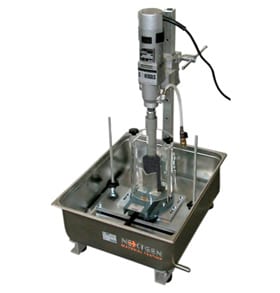
Rock Mechanics Testing Equipment

Standards
AASHTO T126, AASTHO T23, ASTM C39, ASTM C617, ASTM C192, ASTM C31, EN 12390-1, EN 12390-3, ASTM C42, EN 12504-1






Description
Designed specifically for laboratory use, this laboratory coring machine excels in cutting core samples from robust materials like rock and concrete. Equipped with a secure clamp to firmly hold the material during the cutting cycle, the coring process is safeguarded by a transparent cylinder. Explore additional capabilities with a specialized clamping device for the preparation of rock samples from core pieces. Please note that drill bits are not included with the machine.
Laboratory Coring Machine Technical Specifications
|
NG-Coring 2000 |
|
|---|---|
|
Power Input |
1800 W |
|
Rated Speed (rpm) |
1485 / 2720 |
|
Coring Range |
from 8 to 100 mm diameter |
|
Dimensions of the Base Tray Assembly |
23.6 x 19.7 x 7.87" / 60 x 50 x 20 cm |
|
Weight |
177lbs / 80 kg |
Drill Bits with Spigot Adapters
|
Model |
Description |
Specimen Diameter (mm) |
Specimen diameter (inches) |
D.C.D.M.A reference |
|---|---|---|---|---|
|
NG-C0342 |
Diamond Core Bit |
21.46 |
0.85 |
EX |
|
NG-C0343 |
Diamond Core Bit |
30.10 |
1.185 |
AX |
|
NG-C0344 |
Diamond Core Bit |
38.10 |
1.500 |
1.5 in. |
|
NG-C0345 |
Diamond Core Bit |
42.04 |
1.655 |
BX |
|
NG-C0346 |
Diamond Core Bit |
54.74 |
2.155 |
NX |
|
NG-C0347 |
Diamond Core Bit |
63.50 |
2.5 |
HQ |
FAQs
The Laboratory Coring Machine is designed to facilitate the extraction of core samples from hard materials within a laboratory environment. It serves as a critical tool for geologists, engineers, and scientists studying the properties and structures of materials such as rock and concrete.
The machine operates by cutting circular sections, or "cores", out of these materials. These cores can then be examined and tested to yield valuable data. Whether it's analyzing the composition of a rock sample, determining the strength of concrete, or studying the layered structure of various substrates, the Laboratory Coring Machine and Bits offers an efficient, reliable method of obtaining the necessary samples for such investigations.
Please note, the machine and the Diamond Core Bits, which are needed for coring, are sold separately. The ability to select from different bit sizes also allows users to tailor their sampling processes to the specific requirements of their research.
Click here to learn more about the product or here to receive a personalized quote.
The Laboratory Coring Machine incorporates a dedicated clamping system designed to securely hold the material during the cutting cycle. This feature is vital for the smooth and safe operation of the machine. The clamp firmly holds the hard material, such as rock or concrete, in position, ensuring stability and precision throughout the coring process. The firm hold prevents any potential displacement of the material that could interfere with the accuracy of the core samples or present safety risks.
The reliable clamping system in the Laboratory Coring Machine offers users the assurance of a stable and secure operation during the cutting cycle, allowing them to focus on the extraction and subsequent analysis of core samples. This secure handling of materials is part of what makes the Laboratory Coring Machine an efficient, dependable tool for core extraction in a laboratory environment.
Click here to learn more about the product or here to receive a personalized quote.
The coring area of the Laboratory Coring Machine is protected by a transparent cylinder. This clear cylinder acts as a barrier, providing an important level of safety during the cutting process. As the machine is engaged in cutting core samples from hard materials like rock or concrete, this protective cylinder prevents any particles or fragments from being ejected outwards, thereby ensuring the safety of the user and the surrounding environment.
The transparent nature of the cylinder offers an additional advantage. It allows the operator to visually monitor the coring process in real time. This transparency can be crucial for spotting any issues early, ensuring the machine is functioning as it should, and that the core sample is being extracted correctly. In a nutshell, the transparent cylinder is an essential feature of the Laboratory Coring Machine that not only enhances safety but also allows for efficient operation and oversight of the coring process.
Click here to learn more about the product or here to receive a personalized quote.
The Laboratory Coring Machine comes with a specially designed clamping device. This is used after a core sample has been cut from a hard material, like rock. Once you've taken a core sample, you often need to do more work on it before it's ready for study or testing. That's where the clamping device comes in handy.
The clamping device holds the core sample securely. This means you can make extra cuts or do other preparation work on the sample without worrying about it moving around. This can be very important in a laboratory setting, where samples often need to be prepared in a very specific way.
In addition to keeping the sample steady, the clamping device also makes it safer to work on the sample. It keeps the sample in place, so you can focus on preparing it correctly.
Click here to learn more about the product or here to receive a personalized quote.
The Laboratory Coring Machine boasts a robust power capacity of 1800 watts. This substantial power rating ensures that the machine can effectively cut core samples from highly resilient materials such as rock and concrete. This power plays a critical role in delivering consistent performance, particularly in a demanding laboratory environment where accuracy and efficiency are paramount.
The machine's 1800 watt power capacity not only enhances its ability to penetrate hard materials but also contributes to its overall performance, durability, and reliability. It ensures that the Laboratory Coring Machine can handle rigorous tasks while maintaining operational precision, making it an indispensable tool for labs involved in core sample analysis and testing.
The power rating of a coring machine is directly related to its operational capabilities and the quality of results it can produce. Therefore, the 1800 watts of power provide the Laboratory Coring Machine with the ability to meet and exceed the expectations of its users.
Click here to learn more about the product or here to receive a personalized quote.
The Laboratory Coring Machine offers two distinct coring speeds: 1485 and 2720 revolutions per minute (rpm). These varying speeds allow for a degree of flexibility and control in the coring process, depending on the type of material being sampled and the specific requirements of the task at hand. For instance, a slower speed of 1485 rpm may be more suitable for harder materials, allowing for better precision and minimizing the risk of damage to the sample.
On the other hand, the faster speed of 2720 rpm might be more efficient for softer materials, permitting quicker core extraction. Therefore, having these two speeds enhances the machine's versatility, making it capable of handling a wider range of materials and laboratory conditions. It's this adaptability that makes the Laboratory Coring Machine an invaluable tool for any facility requiring precise and efficient core sampling.
Click here to learn more about the product or here to receive a personalized quote.
The Laboratory Coring Machine has a coring range that extends from 28 to 60 millimeters in diameter. This range refers to the size of the core samples that the machine can extract from hard materials like rock or concrete. Depending on the particular requirements of the study or analysis being conducted, users can adjust the machine to extract smaller cores of around 28 millimeters in diameter, larger cores of up to 60 millimeters, or any size in between.
This broad coring range gives the machine a high degree of flexibility and versatility. In many research or laboratory contexts, different tests or analyses may require core samples of different sizes. With its adjustable coring range, the Laboratory Coring Machine is capable of fulfilling these diverse requirements, making it a highly valuable and adaptable tool for any lab.
The ability to accurately extract cores of a specific size also helps to ensure the reliability and consistency of testing results. By providing uniform, accurately-sized samples, the Laboratory Coring Machine helps to eliminate potential sources of error or variation in test results, thereby improving the overall accuracy and reliability of the laboratory work.
Click here to learn more about the product or here to receive a personalized quote.
The Base Tray Assembly of the Laboratory Coring Machine measures 60 centimeters by 50 centimeters by 20 centimeters. These dimensions refer to the length, width, and height of the base tray, respectively. This spacious base tray offers ample room for securing and processing the materials from which core samples are to be extracted. With these dimensions, the base tray can accommodate a wide variety of sample sizes, enhancing the machine's versatility in handling different materials.
Furthermore, the size of the base tray assembly is designed to ensure the stability of the machine during the coring process, thereby promoting safety and accuracy. The thoughtful design of the base tray assembly, as demonstrated by its generous dimensions, contributes to the overall usability and efficiency of the Laboratory Coring Machine in a laboratory setting.
Click here to learn more about the product or here to receive a personalized quote.
The Laboratory Coring Machine has an approximate weight of 80 kilograms. The weight of a machine like this is an important factor to consider for several reasons. First, the weight can impact the machine's installation process and its placement within the laboratory. A machine of this weight requires careful handling and a solid, stable surface to ensure it can operate correctly and safely.
Secondly, the weight of the machine influences its operational stability. The Laboratory Coring Machine, weighing 80 kilograms, is sturdy enough to withstand the vibration and force generated during the coring process, particularly when working with hard materials such as rock and concrete. This stability is crucial in maintaining the accuracy of the core samples extracted and ensuring user safety during operation.
Furthermore, the weight may also affect the transportation of the machine. If the machine needs to be moved or transported to a different location, arrangements would need to be made to handle a machine of this weight.
Click here to learn more about the product or here to receive a personalized quote.
The NG-C0342 model is a Diamond Core Bit designed to work with the Laboratory Coring Machine. This specific model is capable of cutting specimens with a diameter of 21.46 millimeters, or approximately 0.85 inches. This makes it ideal for applications where relatively small core samples are required. The Diamond Core Bit is equipped with industrial-grade diamonds, making it extremely durable and capable of penetrating even the hardest materials such as rock and concrete with ease.
The model NG-C0342 is identified with a D.C.D.M.A reference of 'EX', which is a standard coding system used in the industry to specify the size and type of drilling equipment. This reference can help users in selecting the correct bit for their specific coring requirements. Therefore, this Diamond Core Bit is a reliable and efficient tool for extracting precise core samples in a laboratory setting.
Click here to learn more about the product or here to receive a personalized quote.
The NG-C0343 is a model of the Diamond Core Bit designed for use with the Laboratory Coring Machine. It is capable of creating core samples with a diameter of 30.10 millimeters, or approximately 1.185 inches. This size of the core sample is notably larger than what some other models produce, making this bit especially suitable for tasks that require a more substantial core sample.
The Diamond Core Bit is known for its durability and strength, able to handle the rigors of cutting through tough materials such as concrete or rock. The diamond-tipped bit provides a sharp and resilient cutting edge, ensuring clean and precise cuts every time.
Furthermore, this particular model carries the D.C.D.M.A reference 'AX'. The D.C.D.M.A, or the Diamond Core Drill Manufacturers Association, is an industry-standard coding system that provides information about the size and type of drilling equipment. The 'AX' reference can assist users in identifying the correct bit for their particular coring needs. All these attributes make the NG-C0343 Diamond Core Bit an effective and reliable tool for laboratory coring tasks.
Click here to learn more about the product or here to receive a personalized quote.
The NG-C0344 is a specific model of the Diamond Core Bit that can be used with the Laboratory Coring Machine. This model is designed to extract core samples with a diameter of 38.10 millimeters, which equates to roughly 1.500 inches. This makes the NG-C0344 a suitable choice for applications that require moderately large core samples.
The Diamond Core Bit, as its name suggests, features diamonds - one of the hardest substances known to man - which enable it to cut through tough materials such as concrete and rock. This ensures the bit's durability and ability to perform consistently over time.
The NG-C0344 model carries a D.C.D.M.A reference of '1.5 in.'. The Diamond Core Drill Manufacturers Association (D.C.D.M.A) reference is a standard in the drilling industry that provides important information about the size and type of the drilling equipment. This specific reference can aid users in choosing the correct bit for their specific coring needs.
Click here to learn more about the product or here to receive a personalized quote.
The NG-C0345 is a specific model of the Diamond Core Bit that's designed to work with the Laboratory Coring Machine. This bit is capable of cutting specimens with a diameter of 42.04 millimeters, or about 1.655 inches. This size makes it a versatile option for various applications, as it can accommodate a wide range of coring requirements.
One of the defining features of the Diamond Core Bit is its diamond tip, which allows it to easily penetrate hard materials, such as rock and concrete. This ensures that the bit can consistently produce accurate and clean core samples, even under challenging conditions.
The NG-C0345 model carries a D.C.D.M.A reference of 'BX'. The D.C.D.M.A, or the Diamond Core Drill Manufacturers Association, is an industry-standard coding system that provides important information about the size and type of drilling equipment. Users can refer to this code to ensure that they are choosing the right bit for their particular coring needs.
Click here to learn more about the product or here to receive a personalized quote.
The NG-C0346 is a model of the Diamond Core Bit specifically designed for use with the Laboratory Coring Machine. This bit is designed to handle the extraction of core samples with a diameter of 54.74 millimeters, or approximately 2.155 inches. With its relatively large size, it is an excellent choice for tasks that demand larger core samples.
Like all Diamond Core Bits, the NG-C0346 features industrial-grade diamonds on its cutting surface, allowing it to cut through tough materials such as rock and concrete with ease and precision. This ensures consistent, high-quality core samples and prolongs the life of the bit, providing excellent value for laboratories dealing with these types of materials.
The NG-C0346 model comes with a D.C.D.M.A reference of 'NX'. D.C.D.M.A, or the Diamond Core Drill Manufacturers Association, establishes industry standards for the size and type of drilling equipment. The 'NX' reference code helps users identify the appropriate bit for their specific coring requirements.
Click here to learn more about the product or here to receive a personalized quote.
The NG-C0347 is a specific model of the Diamond Core Bit designed for use with the Laboratory Coring Machine. It is capable of extracting core samples with a diameter of 63.50 millimeters, or approximately 2.5 inches. This makes the NG-C0347 model the largest bit size among the listed models and is particularly suitable for applications requiring larger core samples.
The Diamond Core Bit gets its name from the industrial-grade diamonds that are embedded in its cutting edge. These diamonds allow the bit to cut through hard materials, such as rock and concrete, providing clean, precise cuts. This ensures reliable performance and high-quality core samples consistently.
The NG-C0347 model carries a D.C.D.M.A reference of 'HQ'. D.C.D.M.A, or the Diamond Core Drill Manufacturers Association, is a standardized coding system used in the industry to specify the size and type of drilling equipment. This specific reference can assist users in choosing the right bit for their coring needs.
Click here to learn more about the product or here to receive a personalized quote.
Related Products
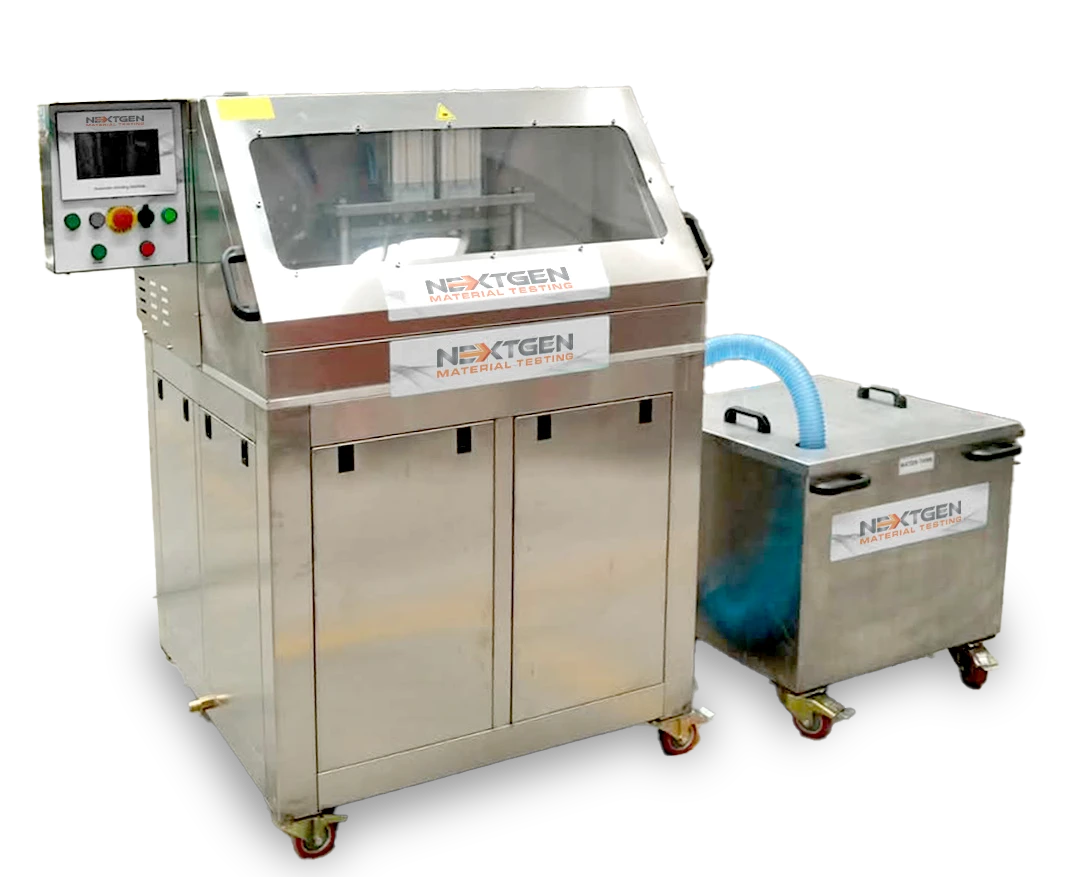
Automatic Core Grinding Machine For Sample Preparation - CoreGrind 3000
CoreGrind 3000 is a fully automatic rock core grinding machine for sample preparation before laboratory testing. It uses 7-inch touchscreen electronic control with recipe-based operation and pneumatic sample locking. An automatic recirculating water spray system is used during grinding for dust control. CoreGrind 3000 is available in two versions: V1 for 1.50 to 3.94 in (38 to 100 mm) cores and V2 for 1.97 to 6.30 in (50 to 160 mm) cores.
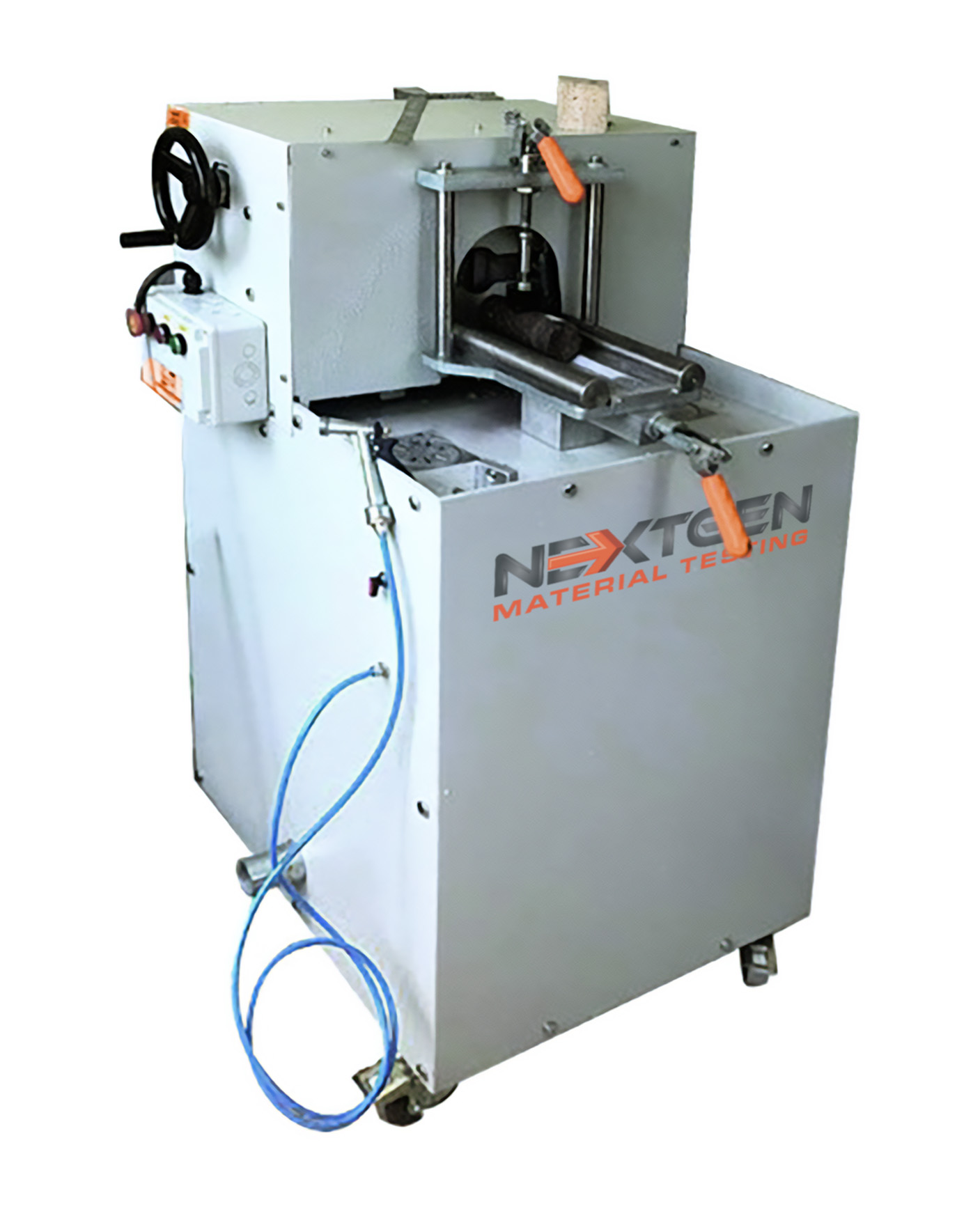
Semi-Automatic Core Grinding Machine - NG-CoreGrind 1000
Our Semi-Automatic Core Grinding Machine (also known as Coregrinder or Core Grinder) is the preferred alternative to the traditional rubber / sulfur capping methods used by Quality Labs
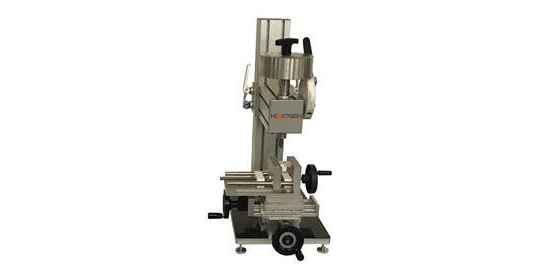
West Cerchar Abrasivity Index Tester
Description The West Cerchar Abrasivity Index Tester is designed to determine the rock abrasivity index (CAI) for the purpose of quantifying the classification of rock materials abrasivity. This type of test is especially valuable in the mining industries, underground construction […]
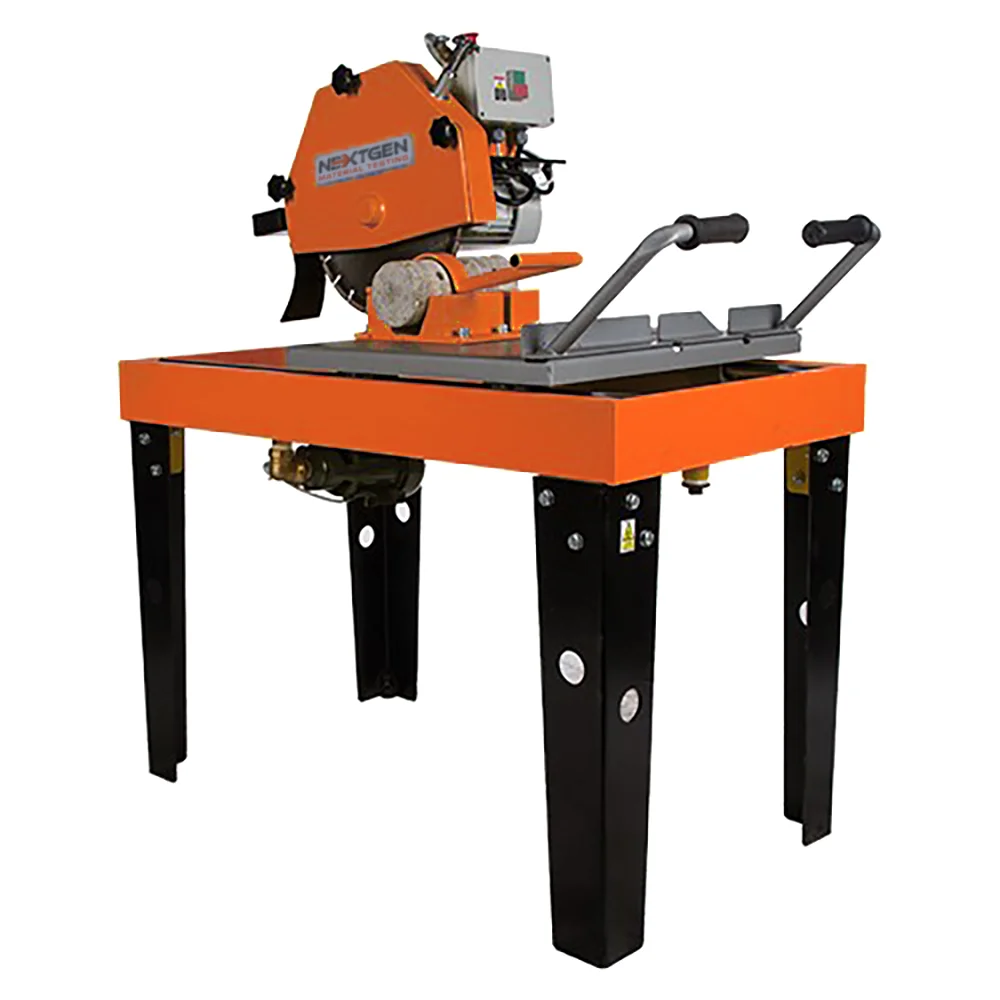
Rock Core Cutter and Masonry Saw
Our Rock Core Cutter and Masonry Saw designed for preparing concrete, rock, or natural stone cores and test specimens.
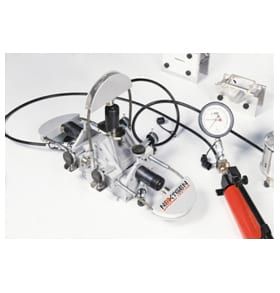
Rock Shear Box Apparatus
This apparatus was originally developed at Imperial College, London, by Professor E. Hoek. It is a simple and practical method of determining the strength and slope stability of rock, both in the field and in the laboratory.
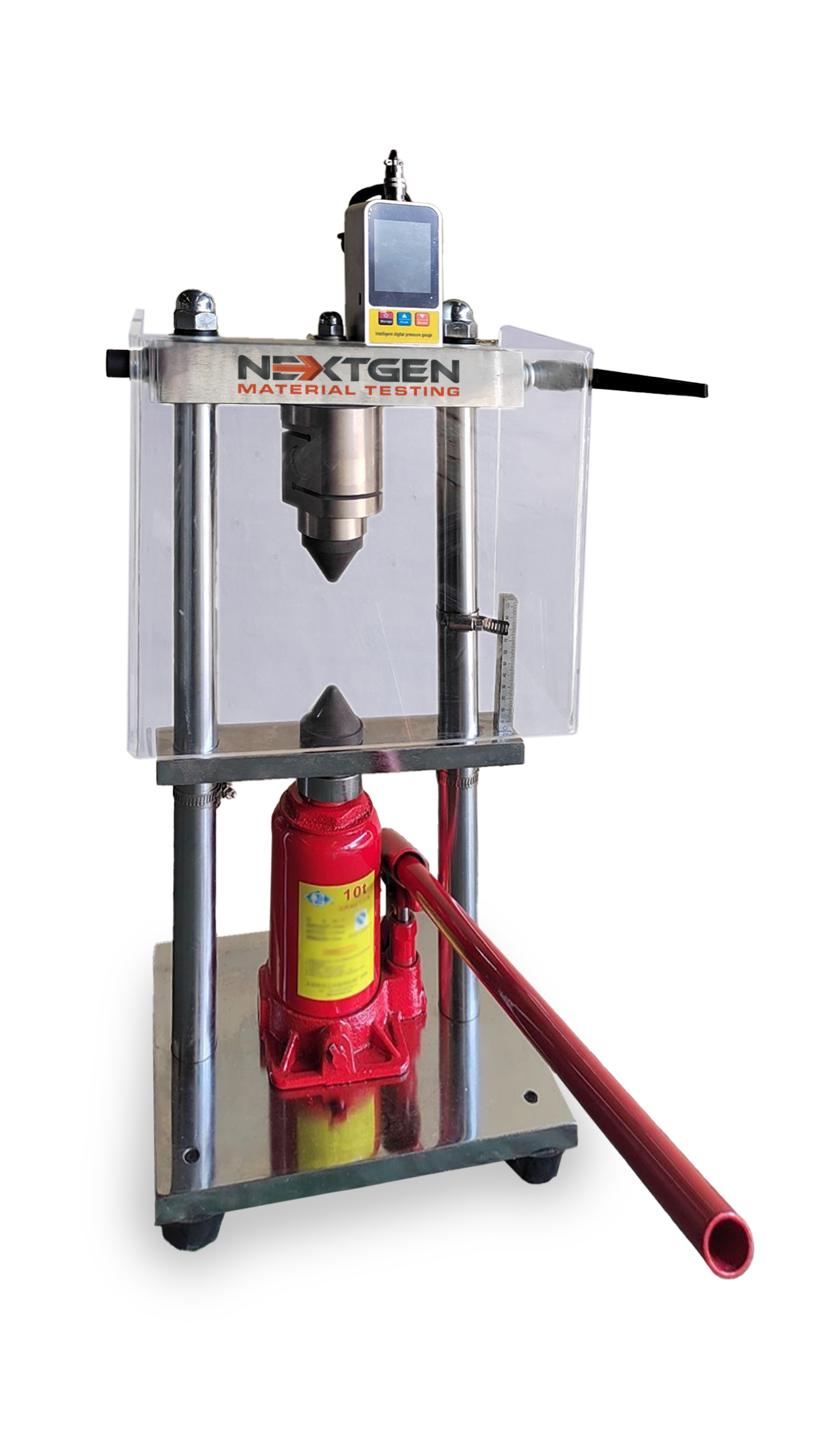
Point Load Tester: Portable Rock Strength Testing for Field Applications
Discover the high-precision Point Load Tester for fast and reliable rock strength testing as a cost-effective solution for geotechnical and construction projects.
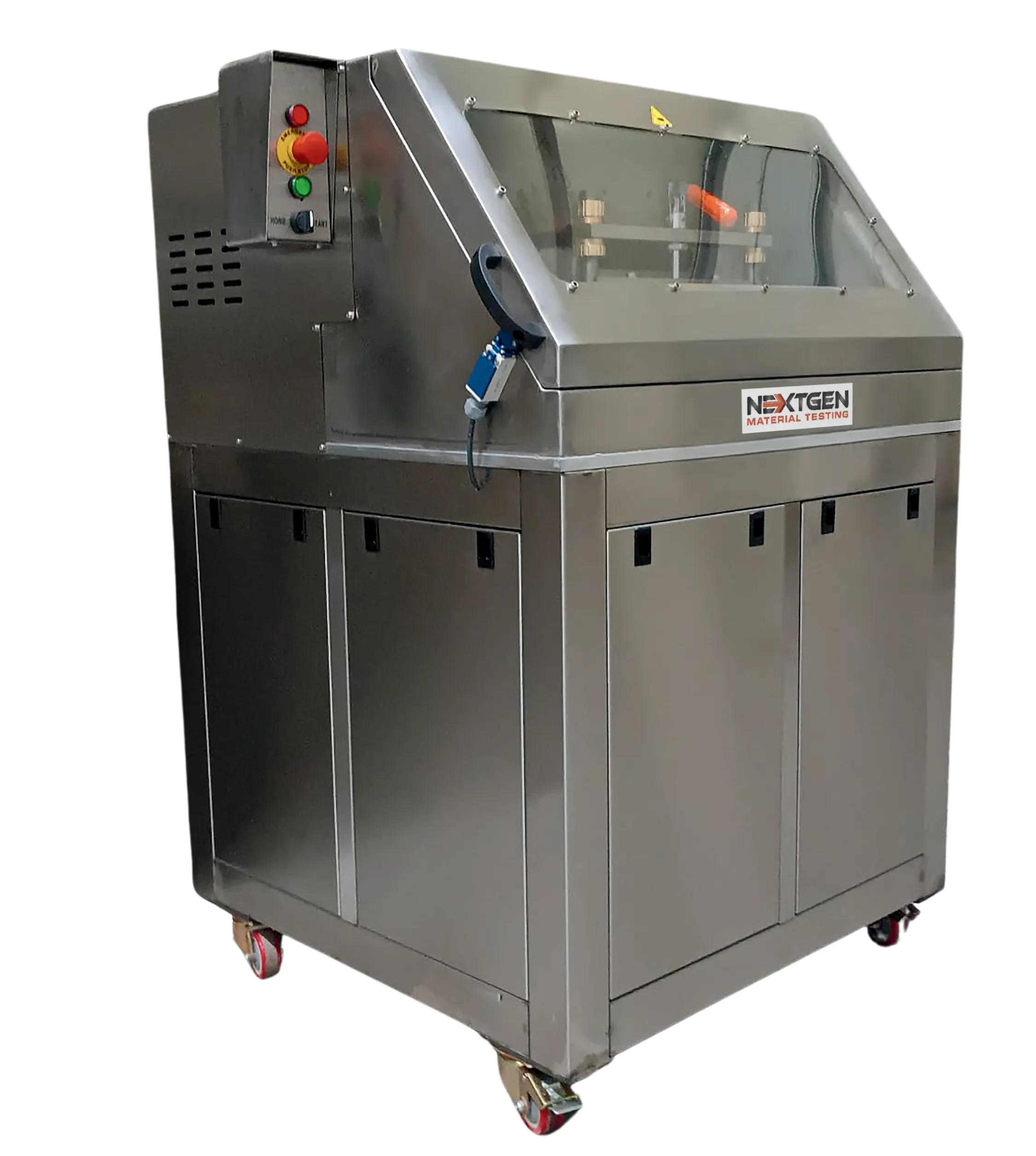
Core Cutting Machine for Sample Preparation – CoreTrim 3000
CoreTrim 3000 is a fully automatic core cutting machine for rock sample preparation. It cuts cylindrical core samples from 1.50 to 3.94 in (38 to 100 mm) and supports up to 3 samples per cycle for 3.94 × 7.87 in (100 × 200 mm) specimens. The cutting cycle is electronically controlled and completes automatically, including blade return to Home Position. An integrated water spray is applied during cutting to reduce dust. CoreTrim 3000 is used in rock mechanics testing laboratories and other workflows where core specimens must be cut before testing.
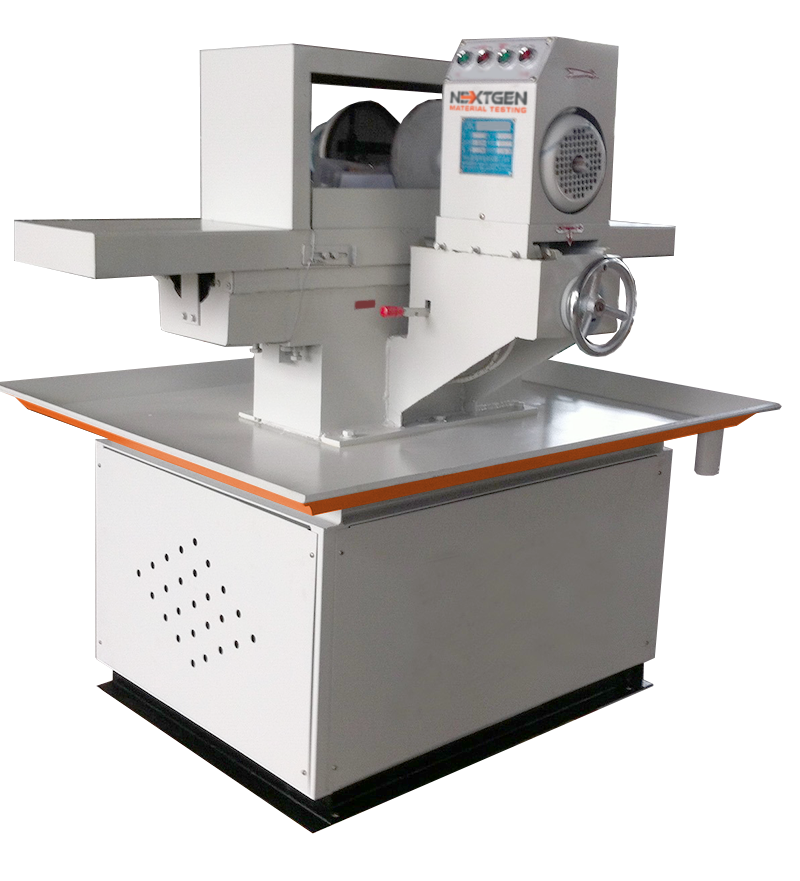
Double Faced Rock Core Grinder Machine NG-CoreGrind 2000
CoreGrind Double faced core grinder machine is designed to grind and polish the end surfaces of concrete & rock cube and cylinder specimens.